When it comes to the recent and current economic landscape, “uncertain times” have seemingly become far more common than anything resembling predictability. Perhaps it’s “the new normal” or maybe it’s just a blip in history, but either way, it requires nimble and deliberate navigation by promo companies.
From inflation and high interest rates to wavering threats of a recession, the economy is not exactly giving decision-makers a chance to exhale. Not to mention the fact that it’s an election year that could bring completely different policies and pick-your-poison supply chain headaches, all issues that will be covered at PPAI’s North American Leadership Conference.
- PPAI Research’s recent bi-monthly survey indicated that industry revenue grew by 1.5% in February and March compared to the same months in 2023.
- That number is less than half the rate of inflation, which snuck back up to 3.5% in March.
- However, even a pessimistic look at the industry’s modest growth would have to admit that it’s more or less in line with the U.S. economy, which grew at a pace of 1.6% in the first quarter.
“PPAI 100’s 1.5% growth aligns with the US GDP’s 1.6% pace, reflecting a subdued yet synchronized trajectory, but trailing behind inflation,” says Alok Bhat PPAI’s market economist and research lead. “This modest growth, set against rising prices, calls for strategic agility and innovation to navigate economic headwinds and create pathways for sustained success.”
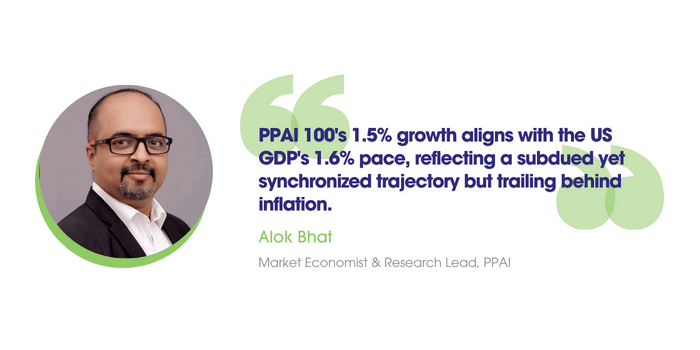
The state of the economy is in an eye-of-the-beholder outlook right now. On one hand, economists currently see the chances of a pending recession to be less than half of what they estimated roughly six months ago. But on the other hand, economists surveyed by Bloomberg expected the economy to grow by 2.5% in Q1, nearly a full percentage point more than what reality produced.
- The February/March bi-monthly survey conducted by PPAI Research found that “economic uncertainty” remains the biggest concern for promo companies, though the number of respondents citing those issues has decreased over the past six months.
“I think the PPAI survey hit it out of the park,” says Pierre Montaubin, CEO of Koozie Group. “Economic uncertainty – inflation, international geopolitics, interest rates going down or not – is the number one challenge distributors and suppliers alike will have to fight this year.”
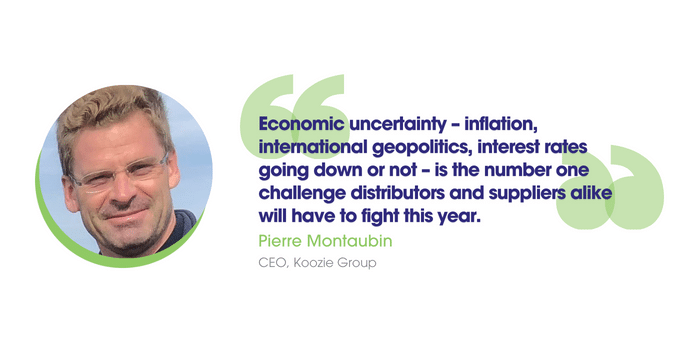
So, where do things stand? More importantly, where are they going? Below is a briefing on several of the most relevant economic factors promo businesses are facing, along with some expert perspectives on what that might mean for the near future.
What Should We Make Of Inflation?
To say that inflation, which reached 8% at the end of 2022, has cooled off would perhaps be an overstatement, at least in terms of its real-world implications on American people.
“The thing about inflation is that it’s pernicious,” says Andrew Busch, an economic futurist and former chief market intelligence officer for the U.S. government. “It sticks around once it gets into your economy, and the central bank made a grave error in allowing that to occur.”
- The real challenge this poses is not necessarily the exact rate of inflation but the results of its rise, which caused price levels to go up.
- That’s problematic for a company’s profits as well as for people’s ability to do things such as buy homes. All of this factors into the conditions that make it difficult to imagine inflation returning to levels that many got used to in the previous decade.
- Busch has consistently been advising his clients that it will be a matter of years, not months, before inflation returns to 2%.
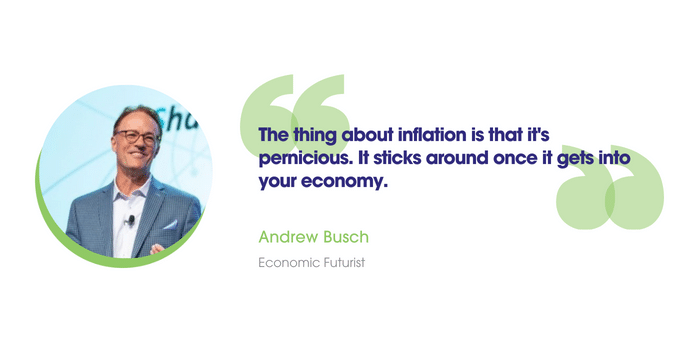
“Inflation is just going to bounce around a little bit, but it’s just going to be slow going down,” says Busch, who will be speaking at PPAI’s North American Leadership Conference. “Interest rates are going to stay high as well.”
For some promo companies, those high interest rates are just as important a factor as anything. With borrowing costs up – and expected to stay there – it puts a greater burden on businesses to be purposeful with their usage of available cash.
Chris Anderson, CEO of HPG, told PPAI Media that such conditions have led to the supplier putting a greater focus on supply chain and business process efficiency. “For instance, we can dramatically improve our cash conversion cycle by vertically integrating the production of staple items – such as tote bags or water bottles – at a company-owned facility located in North America,” Anderson says.
Andrew Spellman, VP of commercial sales at Therabody and chair of PPAI’s Board of Directors, preaches patience through circumstances that can put a stress on small and large businesses alike.
“We are in a tough economy right now,” Spellman says. “The levers being pulled to reduce inflation are not working as well as anticipated, and both suppliers and distributors are feeling the effects. The outlook remains positive, though, and the expectation is that brighter skies are ahead in the near future.”
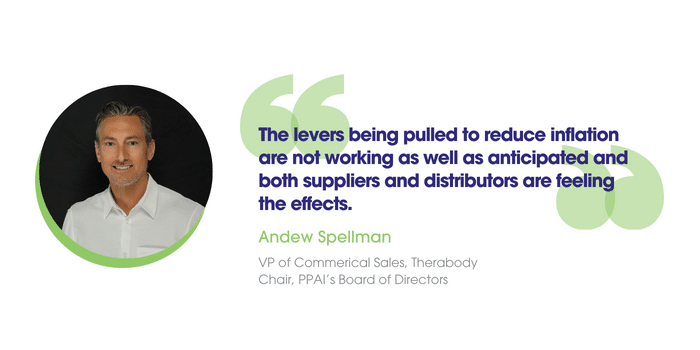
How Does An Election Year Affect The Promo Economy?
For many promo companies, a general election brings an uptick in business.
- Compared to midterm or city council elections, the polls for presidential elections demand a lot of candidate-branded merchandise. About 1 in 10 Americans display a yard sign for their preferred candidate.
That dynamic shouldn’t change in 2024, but most people paying even cursory attention would probably admit this is not a typical presidential election. Polarizing or not, these candidates do, in some cases, have drastically different policies.
It is likely – but not certain – that either candidate would take office with a split Congress, which would make it difficult for either to pass significant legislation. Still, promo companies would be wise to prepare themselves for the relevant ramifications of either outcome.
However, there’s one area where both Joe Biden and Donald Trump have relatively similar policies: trade. According to Busch, trade policies are likely going to get less favorable for U.S. businesses post-election regardless of who wins.
- Biden recently announced plans to increase steel and aluminum tariffs 25%.
- Meanwhile, during his campaign, Trump has suggested “more than” 60% tariffs on Chinese imports.
“What this election is all about, to some extent for businesses, is understanding their supply chain,” says Busch. “Where does it run through? Does it run through China? If it does, can you de-risk away from China?”
- Last year, PPAI Magazine covered promo’s ongoing retreat from China.
- PPAI’s L.E.A.D. gives promo professionals the opportunity to advocate to legislators in-person on behalf of the industry, and Chinese tariffs will be on the agenda this year.
Montaubin says that as important as preparation for Koozie Group is a faith in the company’s core mission.
“An election year is always interesting in our industry,” Montaubin says. “In times like this, standing by your customer’s side and adding value can help them navigate the uncertainty, and we are ready to serve them in the way they deserve with all the improvements we’ve made over the last couple of years.”
Navigating The Future
There’s ultimately no predicting the future. There’s only preparing for possibilities.
Dale Denham, MAS+, president and CEO of PPAI, advises companies to stay aware and nimble but try to avoid letting the most recent report disproportionately guide your strategies.
“Economic predictions can be useful, yet they often overlook the nuances of particular markets and the varying conditions across regions,” Denham says. “It’s essential to strategize not just to surpass these forecasts, but also to prepare for potential setbacks. Aim high – your focus largely determines your results, shaping the trajectory of your outcomes in significant ways.”
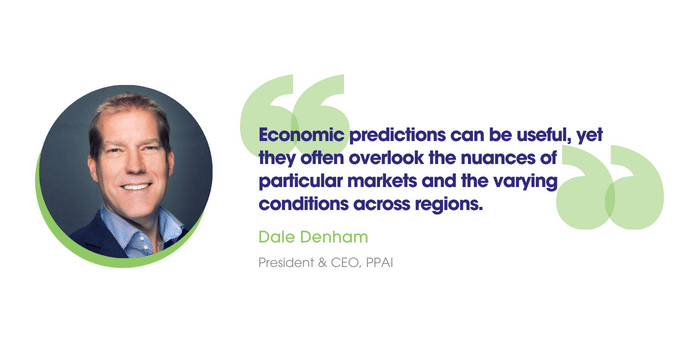
Busch echoes this notion, in part, claiming that “don’t doomscroll” is the easiest piece of advice he can give people.
About 10 months ago, reports of a pending recession were common. PPAI Media even published a special report on the industry’s divided outlook on the possibility of a recession and how to approach it.
Economists look premature in those predictions with hindsight of 2024. Yet still, the current economic editions certainly do not guarantee a near future recession is out of the question.
Busch reminds us that individual people or companies can not only survive but strategically set themselves up for the future during down economies if they are fortunate enough to be financially prepared to take advantage of opportunities.
“Boy, can you get great deals on stuff,” Busch says of down economies. “Those are the opportunities that are just gold.”
Finally, economic uncertainty should not necessarily create static strategies, according to Busch.
“I think the risk is that, because there’s so much uncertainty, executives don’t make a decision,” Busch says. “I think that’s the wrong approach. Assess the decision.”


